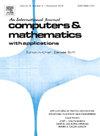二维平流扩散方程的局部保守特性有限差分理论分析与数值方案
IF 2.9
2区 数学
Q1 MATHEMATICS, APPLIED
引用次数: 0
摘要
本文分析了二维平流扩散方程的质量守恒特征有限差分方案。首先,沿 x 方向,在拉格朗日网格上应用片断抛物线法(PPM)得到解 {U˜i,jn},其中 x¯ 采用一阶 Runge Kutta 方案求解。其次,采用 PPM 方案沿 y 方向求解 Ω¯i,j(tn)上的质量 M¯i,jn。最后,构建局部保守特征有限差分方案。通过一些辅助定理,我们证明了我们的方案是稳定的,并得到了最优误差估计。我们的方案在空间上具有二阶收敛性,在时间上具有一阶收敛性。数值实验用于验证理论分析。本文章由计算机程序翻译,如有差异,请以英文原文为准。
Theoretical analysis and numerical scheme of local conservative characteristic finite difference for 2-d advection diffusion equations
In this paper, the mass conservative characteristic finite difference scheme for 2-d advection diffusion equations is analyzed. Firstly, along x-direction, we obtain the solutions by applying the piecewise parabolic method (PPM) on the Lagrangian grid where is solved using the first-order Runge Kutta scheme. Secondly, the mass over are solved by the PPM scheme along y-direction. Finally, the local conservative characteristic finite difference scheme is constructed. By some auxiliary lemmas, we prove our scheme is stable and obtain the optimal error estimate. Our scheme is proved to be of second order convergence in space and of first order in time. Numerical experiments are used to verify the theoretical analysis.
求助全文
通过发布文献求助,成功后即可免费获取论文全文。
去求助
来源期刊

Computers & Mathematics with Applications
工程技术-计算机:跨学科应用
CiteScore
5.10
自引率
10.30%
发文量
396
审稿时长
9.9 weeks
期刊介绍:
Computers & Mathematics with Applications provides a medium of exchange for those engaged in fields contributing to building successful simulations for science and engineering using Partial Differential Equations (PDEs).
 求助内容:
求助内容: 应助结果提醒方式:
应助结果提醒方式:


